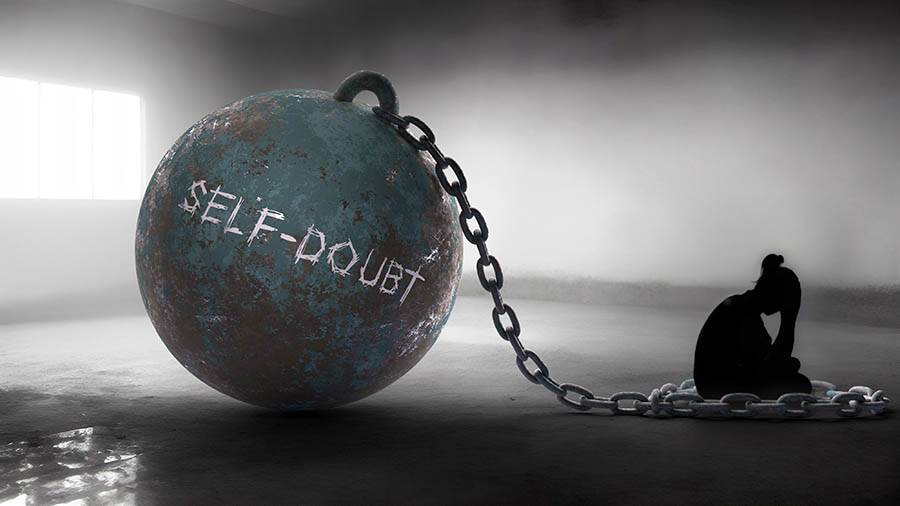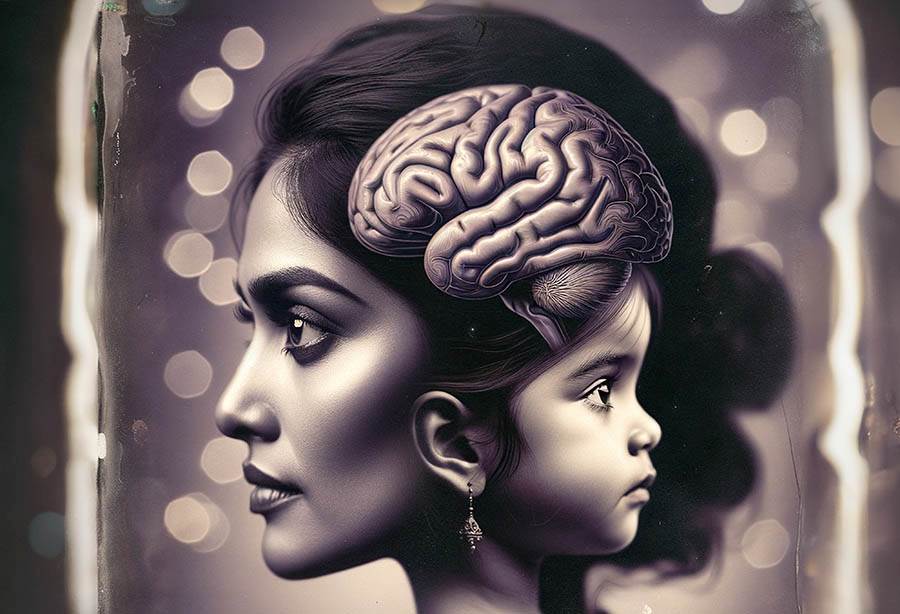Trusting Yourself Amid Self-Doubt and Change by Psychic Bonnie
Date 4/1/2025
Explore More:
Self-Love
Nothing in life is constant – if it were, we'd all probably end up bored to death. And, well, it still wouldn't be constant. Living in a natural sea of change makes it vital to learn how to overcome the self-doubt that can keep us from trusting in ourselves and moving forward in life. Trusting yourself amid self-doubt and change is one of the most powerful skills to cultivate. Once you learn to do that, you have access to a deep knowing that you can handle whatever life throws at you.
The Human Experience of Self-Trust and Self-Doubt
We are naturally equipped to trust ourselves, grow, and move through change. Little blocks start popping up early in life. From the moment we can be aware of our five (six) senses, we make meaning out of what we perceive. Even tiny babies can perceive sounds, physical touch, smells, and sight in ways that make them feel safe or scared.
As we make meaning of what we perceive, we either build self-trust and trust in life to support us or build self-doubt. "I either can, or I can't."
Though we can interpret what we perceive in ways that prove our abilities, worth, and lovability, we are actually hardwired to look for things that are a threat. Originally, we needed to be aware of lions, tigers, and bears to avoid getting killed.
Today, we tend to notice and overthink any critical comment, "look," or possible failure as a threat to our safety. This is our brain's way of protecting us; however, these "threats" are generally not true.
As we perceive more and more things as telling us we are not enough as we are or that don't align with our inner knowing (think advertising and social media), our ability to trust ourselves shrinks, and self-doubt sets in.
This is a part of life, part of the human experience.
We are human and are bound to experience self-doubt sometimes. The goal isn't to completely eradicate it. The goal is to notice when it happens and steer ourselves back into self-trust, which enables us to trust our intuition and trust our tomorrow.
To notice self-doubt, we need to understand what it is and some common root causes.

What is Self-Doubt?
Self-doubt is a lack of faith in ourselves and our abilities. We feel self-doubt when we question our own decisions, skills, or worth. This can lead to feelings of uncertainty, hesitation, and insecurity. We tend to second-guess our actions and decisions, worry about our performance, and fear failure or criticism.
This limits our ability to take risks, pursue goals, or fully engage in our lives. It also limits our connection to our own intuition.
We're all different, and the experiences that might cause me to question my abilities or worth will be somewhat different for someone else. Identifying the origins of self-doubt can illuminate the path to healing and restoring self-trust.
What are Some of the Root Causes of Self-Doubt?
Childhood Experiences and Conditioning: Many of our doubts stem from early life experiences. We learn to trust authorities (well-meaning parents, family, teachers, religious leaders). Criticism, neglect, lack of support, and comparisons to others can create strong beliefs that we are not good enough or capable, and this often sticks with us as adults.
Growing up in an environment where feelings are ignored or invalidated can cause us to distrust our memory, feelings, and intuition. We get confused about what is true.
Social and Cultural Influences: Society and culture impose standards and norms that can contribute to self-doubt. Media tells us what success, beauty, and happiness should look like. This creates unrealistic expectations, which causes us to question our worth and achievements and sometimes obsess about our flaws. Cultural messages about gender, race, and class can reinforce feelings of inadequacy and exclusion.
Negative Self-Talk and Internalized Beliefs: How we talk to ourselves plays a big part in whether we feed self-doubt or self-trust. (Spoiler alert: This is something we can change and use as a tool to get on the path to self-trust.)
The critical voice in our head often echoes past judgments. It focuses on mistakes, perceived failures, and weaknesses rather than strengths and accomplishments. Over time, these negative thoughts become deeply ingrained beliefs that inform our perception of ourselves and our abilities.
Perfectionism: We naturally want to feel accepted and valued. Sometimes, we only learn to get this through validation from those around us. When we interpret our experiences to mean we have to have unrealistically high standards to be valued or loved, we set ourselves up for a cycle of perfectionism and self-doubt.
Perfectionists typically fail to meet their own high standards and create a long list of perceived failures. They constantly worry about not being good enough and fear negative judgment. Procrastination becomes their best friend because it helps them to avoid, at least temporarily, feeling anxious about possibly failing.
Fear of Failure: The fear of failing or making a mistake can stop us in our tracks and make it extremely difficult to make decisions. We also lose trust in our own judgment. How does this start? Here are some examples:
- Childhood experiences with caregivers who have high or unrealistic expectations can instill a fear of failure, especially when we receive praise only when we meet these high expectations and criticism when we don't.
- Academic pressure and comparison with peers.
- Experiences of failure or ridicule in school.
- Societal and cultural norms that stigmatize failure.
- Traumatic failures in the past, especially those that had painful consequences.
- Public humiliation, or humiliation with people who are important to us.
Comparisons: Constantly comparing ourselves to others, especially in today's social media-driven world, can fuel feelings of inadequacy.
Imposter Syndrome: When we discount and doubt our accomplishments despite the evidence, we may feel like frauds and develop a fear that others will discover that we're not really good enough.
Self-fulfilling Prophecies: Whatever we believe can lead to thoughts and actions that prove the belief to be true. When the belief is negative, particularly that we'll fail or that we're not good enough, the results fuel self-doubt.
Now that you know the common root causes of self-doubt, it's time to learn the root causes of your own brand of self-doubt. It's time to figure out what feeds your self-doubt.

How do You Recognize the Root Cause of Your Self-Doubt
Awareness is the next step on the journey from self-doubt to self-trust. When we identify where our self-doubt comes from, we can begin to challenge and reframe these beliefs. Here are some simple techniques to help in this process:
Journal with Guided Reflection Questions
Set aside some uninterrupted time to explore the following questions and keep track of your answers in a journal. It can help to take some slow, deep breaths and calm your mind before you begin. (If journaling is not your thing, try speaking your answers out loud to a friend or using a voice recorder that you can listen to.) Sometimes, re-reading or listening to your answers later will trigger a new aha. Refer to the list of common causes as you answer these questions.
- What is one of the earliest memories you have of feeling self-doubt? Describe the situation and how you felt at the time.
- Can you think of any specific people (e.g., family members, teachers, peers) who contributed to your feelings of self-doubt? How did their words or actions affect you?
- Recall a significant incident where you felt a strong sense of self-doubt. What happened, and how did you respond? What thoughts went through your mind during and after the incident?
- Are there specific situations or triggers that consistently lead to feelings of self-doubt for you? What are they, and why do you think they have this effect?
- When you experience self-doubt, what kind of self-talk do you notice? Are there specific phrases or thoughts that repeat in your mind? How do you feel as you contemplate this?
- How do you typically react to new challenges or opportunities? What thoughts go through your mind? Does this remind you of other times in your life when you felt this way?
- What goes through your mind when you think about life changes, either positive or challenging? What thoughts do you have about the change? What thoughts do you have about yourself?
Life Timeline
Create a timeline of your life, marking significant events, achievements, and setbacks. Reflect on each point to identify moments that may have contributed to self-doubt. Consider how your perception of these events influenced your beliefs about yourself, others, and life.
Mind Mapping
Create a mind map centered around "self-doubt." Branch out with related thoughts, experiences, and feelings. Look for recurring themes or patterns that might point to the causes of your self-doubt.
Feedback from Others
Ask trusted friends, family, or colleagues to share their observations about your self-doubt with you. They might provide insights into behaviors or situations that you haven't considered.
Artistic Expression
Use drawing, painting, or another form of artistic expression to represent the source of your self-doubt. Sometimes, creative activities can help uncover subconscious thoughts and emotions.
Discovering your patterns can take time. Give yourself as much time as you need. Have compassion for yourself and know that you are already building your self-trust muscle just by taking action on this. So, congratulate yourself and keep going!

How do You Stop Self-Doubt and Overthinking
Overcoming self-doubt is the key to building self-trust. It involves developing practices that foster self-awareness, self-compassion, and changing your mindset and beliefs. If you've taken the time to discover the sources of your self-doubt, you have already completed the first step to stopping self-doubt and overthinking. Here are some tools for your self-doubt-busting toolbox:
- Identify the Source: Understand where your self-doubt stems from. When you know the root causes, you can dismantle them. Check out the section above: How Do You Recognize the Root Cause of Your Self-Doubt?
- Challenge Your Beliefs: Question the beliefs you've found that cause self-doubt. Are they true? How do you know if they're true? What facts tell you they're not true? If your best friend held these beliefs, what would you say to them?
- Change Your Beliefs: As Abraham said through Esther Hicks, "A belief is nothing more than a thought thought a lot." What is the opposite of your limiting belief? Write this down. Say the opposite to yourself over and over, like a mantra. Over time, thinking this new thought "a lot" contributes to creating a new supportive belief.
- Embrace Failure as a Learning Opportunity: Failure is a natural part of growth. Each setback is a chance to learn and improve. Ask yourself, "What can I learn from this experience?" "What is this teaching me?"
- Call Out Your Inner Critic: We all have one. Learn to recognize this voice and challenge it. Understand that it's a natural part of your thought process, and you have the power to manage it.
- Challenge Negative Thoughts: When you catch yourself overthinking, question the truth of those thoughts. Are they based on facts or assumptions? Be honest with yourself. Negative beliefs can trick you into believing assumptions and lies.
- Use Positive Self-Talk: Encourage yourself with affirmations that build your self-trust and adaptability. For example: "I am flexible and always find solutions. I can do this."
- Embrace Discomfort: Accept that self-doubt and discomfort are part of life. Recognize that failure is a possibility, and so is success. Know that whatever happens, you can handle it.
- Take Action: Despite your doubts, take action. Just starting can shift your mindset. And when you're busy doing, there is less room for doubt.
- Embrace Change: Let change be your friend. Instead of overthinking the 'what-ifs,' welcome life changes as opportunities to expand your horizons. With each change, you're not just adapting; you're becoming a more versatile and capable version of yourself.
- Set Small Goals: Break down your goals into smaller, manageable steps. This can help you feel more in control and reduce the pressure that leads to self-doubt. Focus on completing one step at a time can help build momentum and confidence.
- Identify Your Values: Knowing what truly matters to you can help guide your decisions and actions. Align your actions with your values to find motivation and purpose.
- Practice Gratitude: Pausing to appreciate the good, no matter how small, shifts your focus from what's lacking to what's abundant and makes it easier to trust yourself and life. This simple act can transform your mindset, boost your mood, and anchor you in the present. So, take a moment each day to reflect on the positives – it's a powerful antidote to doubt.
- Spend Time With Supportive People: Surround yourself with friends, family, or mentors who encourage you and believe in your abilities.
- Practice Self-Compassion: Be kind to yourself. Acknowledge your efforts and progress rather than fixating on a need for perfection.
- Seek Professional Help: If self-doubt and overthinking significantly impact your life, consider talking to a mental health professional. They can provide tailored strategies and support.
Remember, it's normal to experience self-doubt and to overthink from time to time. Each time you push past those doubts and take action, you're sending a powerful message to yourself: "I am capable." It's like adding a brick to the foundation of your self-trust. With every challenge you face and move beyond, even something as small as deciding what to pack for a trip, you prove to yourself that you can rely on yourself, that your judgment is sound, and that you can handle the curveballs life throws at you. You can trust in yourself and in your tomorrow.
The Importance of Self-Trust in Navigating Life Changes
Self-trust is your inner compass during times of change. It's what guides you through the fog of uncertainty and helps you stay afloat in the sea of change. When you trust yourself, you're more likely to view life's inevitable twists and turns as opportunities for growth rather than insurmountable obstacles.
This trust in your abilities and discernment forms the bedrock upon which you can build a life that's responsive to change, resilient in the face of adversity, and open to new experiences. It's not just about getting through life changes; it's about growing through them.
Self-trust also frees the flow of your intuition, which helps you notice solutions and guides you to people and situations that support your journey.
So, remember, as you work through self-doubt, you're not just overcoming a temporary hurdle; you're cultivating a lifelong skill that will empower you to navigate whatever comes your way with confidence and grace.
If you need some guidance on your journey, reach out to me -- I'm always happy to help.

Takeaway
While self-doubt is a natural part of the human experience, it's important to recognize it and actively work towards building self-trust. This involves understanding the root causes of self-doubt, which can stem from childhood experiences, societal pressures, and internalized negative beliefs, among others.
We can cultivate self-trust by using strategies such as identifying and challenging these root causes, embracing failure as a learning opportunity, and practicing self-compassion. This self-trust acts as an inner compass, especially during times of change, allowing us to navigate life's uncertainties with confidence and view challenges as opportunities for growth.
Overcoming self-doubt is not about achieving perfection but about fostering a deep trust in oneself and one's abilities to handle life's changes.
 Get a Reading with Bonnie x7982
Get a Reading with Bonnie x7982
Upon the prompting of friends, Bonnie began offering tarot and clairvoyant readings in 2001 and is an avid reader of all things spiritual, especially the nature of reality. She has a master’s degree in counseling and further education in personal development and N.E.T. (neuroemotional technique). She specializes in clairvoyant readings to help people navigate their lives.

